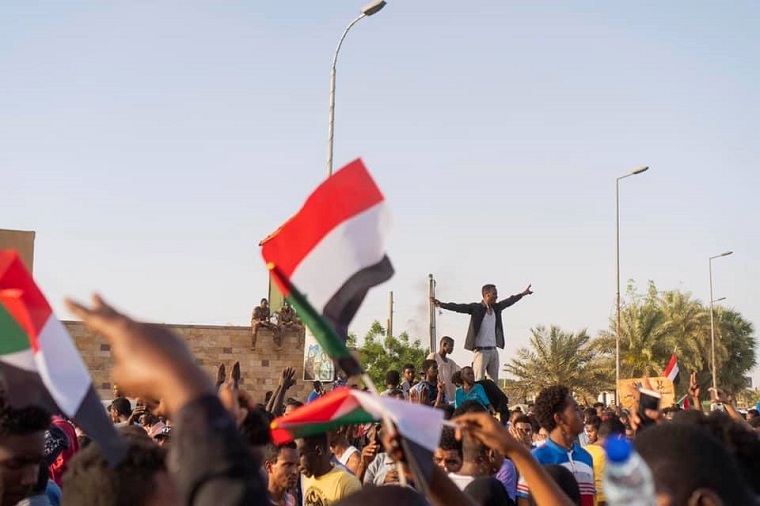
Photo: M.Saleh via Wikimedia Commons Eduardo Stanley / AFSC
In the face of state violence and oppression, people continue to peacefully and courageously demand democracy for Sudan.
After months of planning and anticipation, I won’t be returning to Sudan for my cousin’s wedding this month. Due to the unstable political situation and violence targeting young people leading a revolution there right now, my family had to cancel our tickets.
I’m part of the Sudanese diaspora who ended up in the United States. Today, I work with AFSC’s Communities Against Islamophobia project in North Carolina, and I want to share my thoughts about the peaceful, young demonstrators in Sudan and the violent treatment they have received.
Let me give you some background. In June of 1989, Lt. Gen. Omar al-Bashir seized control of Sudan through a military coup and remained in power for 30 years. Those years were filled with turmoil, war, and violence, and in 2011, a referendum led to the separation of South Sudan, which became an independent state. There followed more years of war, and genocide in Darfur.
Fast forward to 2019, and months of peaceful nationwide demonstrations calling for Bashir’s resignation. The protesters include members of professional unions, lawyers, teachers, and many, many young people. In April, Bashir was arrested and forced from power by a military coup, but the people continued to press for democracy.
On June 3, police and paramilitary Rapid Support Forces (RSF) shot at the nonviolent protesters, killing at least 60 people and injuring over 300. Later, it was discovered that others had been thrown into the Nile, raising the death toll to over 120.
The protesters had been sitting in for two months and were killed on the last day of Ramadan – right before Eid al-Fitr, an important holiday, the date of which is determined by the new moon crescent and confirmed by Islamic authorities. After the massacre, Sudan announced that Eid was on Wednesday, although it had already been determined that it would fall on Tuesday — because they didn’t want protesters to organize. The government had also cut off the internet the day of the massacre, calling it a threat to national security. But doing so also ensures that the voice of the Sudanese people is stifled so the government can control the narrative.
When the protests started back in December, I never would have dreamed that the government would fire on unarmed protesters. They wanted to shatter their momentum, their dream of a different future.
While I was planning my trip back to Sudan, my cousin and his friends were talking about us all going to sit-ins together in Khartoum. I had been excited about that. Sit-ins gave young people a place to sing, hang out, and nonviolently make their voices heard. And then they were massacred.
Now, my cousin says that I am lucky I live in America, where peaceful protesters have some sense of safety – that they will at least not be massacred by their government.
I have immense pride in my people for not resorting to violence after having been shot at, thrown in the Nile, and even raped. People are persevering to find the right avenue to bring democracy to Sudan, and they are showing an immense amount of courage.
What can the situation in Sudan teach us in the United States? With U.S. elections coming up, it should move us to engage in our democratic processes at every level. What’s happening in Sudan reminds us that we cannot take democracy for granted.
I will also continue to use my voice to uplift the narratives in Sudan – and I hope more people join me.
This movement in Sudan flourished because of the resilience of the peaceful protestors and social media – brave individuals using their platforms and their voices. And we should honor their courage and stand with them.
As a starting place, you can learn more about the revolution in Sudan by checking out this comprehensive resource. I also encourage you to share what you learn with family and friends, engaging them in conversations in person and online about what is going on in Sudan.